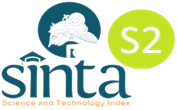TEAMS GAMES TOURNAMENT DALAM MENINGKATKAN HASIL BELAJAR SISWA
DOI:
https://doi.org/10.33477/bs.v2i2.378Abstract
Berdasarkan hasil analisis data yang diperoleh setelah melaksanakan penelitian dapat di simpulkan bahwa terdapat peningkatan hasil belajar dengan menggunakan model pembelajaran kooperatif tipe TGT (teams games tournament) pada materi sistem reproduksi manusia di SMA Batara Gowa. Berdasarkan hasil tes akhir Siklus I dan II, terdapat peningkatan hasil belajar peserta didik yaitu 21,74%. kata kunci: tgt, hasil belajarReferences
Budiningsi H. Asri. 2005. Belajar dan Pembelajaran. PT Rineka Cipta. Jakarta.
Departemen Pendidikan dan Kebudayaan RI. 1991. Kamus Besar Bahasa Indonesia Edisi Kedua. Balai Pustaka. Jakarta.
Djamara, Syaiful Bahri. 2006. Strategi Belajar Mengajar. PT Rineka Cipta. Jakarta.
Minarni. 2009. Upaya Peningkatan Hasil Belajar PKn Model Pembelajaran Problem Based Learning siswa kelas X MAN I Model kota Bengkulu. MAN I Model Bengkulu. Bengkulu.
Mulyasa, E. 2008. Menjadi Guru Profesional. PT Remaja Rosada Karya. Bandung.
Munthe, Bermawi. 2009. Desain Pembelajaran. PT Pustaka Insan Madani. Jogjakarta.
Pupuh dan M. Sobry, 2009. Strategi Belajar Mengajar. PT Rafika Aditama. Bandung.
Pribadi, Benny A. 2009. Model Desain Sistem Pembelajaran. Dian Rakyat. Jakarta.
Silberman dalam Silkia Puspita Kencana. 2010. Strategi Pembelajaran Inquiring Minds Want To Know (Menggali Pikiran Yang Ingin Tahu) Dan True Or False (Benar Atau Salah) Untuk Meningkatkan Hasil Belajar Biologi Pada Pokok Bahasan Keanekaragaman Hayati Pada Siswa Kelas X1 Man 1 Surakarta. Skripsi. Universitas Muhammadiyah Surakarta. Surakarta.
Sudjana, Nana. 1996. Kurikulum di Sekolah. Sinar Baru Algesindo. Bandung.
Suryosubroto, D. 1990. Dasar-dasar Kependidikan. Rineka Cipta. Jakarta.
Usman, Uzer. 2005. Menjadi Guru Profesional. Remaja Rosdakarya. Bandung
Downloads
Published
Issue
Section
License
Authors who publish with this journal agree to the following terms: Authors retain copyright and grant the journal right of first publication with the work simultaneously licensed under a Creative Commons Attribution License that allows others to share the work with an acknowledgement of the work's authorship and initial publication in this journal. Authors are able to enter into separate, additional contractual arrangements for the non-exclusive distribution of the journal's published version of the work (e.g., post it to an institutional repository or publish it in a book), with an acknowledgement of its initial publication in this journal. Authors are permitted and encouraged to post their work online (e.g., in institutional repositories or on their website) prior to and during the submission process, as it can lead to productive exchanges, as well as earlier and greater citation of published work.














